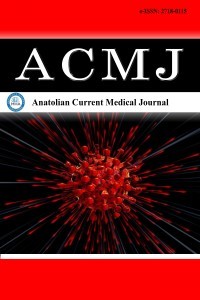
Anatolian Current Medical Journal
Yazarlar: Bülent Barış GÜVEN, Hüseyin ŞEN, Sezai ÖZKAN, Güner DAĞLI
Konular:Sağlık Bilimleri ve Hizmetleri
DOI:10.38053/acmj.822786
Anahtar Kelimeler:Postoperative pain,A118G polymorphism,Tramadol,Mu opioid receptor
Özet: Introduction: The analgesic efficacy and side effects of opioid medications show great inter-individual differences. Genetic studies have indicated that this difference is considerably associated with the relationship between opioid and receptor. Therefore, in this study it was aimed to investigate the effect of A118G polymorphism on postoperative tramadol consumption and opioid-related side-effects after gynecological surgery performed. Material and Methods: Evaluation was made of 80 patients with I-II ASA status, scheduled for gynecological surgery performed with a pfannenstiel incision under general anesthesia. Genomic DNA was extracted from the blood samples. After surgery, all of the patients were equipped with an intravenous Tramadol patient-controlled analgesia device and tramadol consumption was measured. Pain scores were measured with a numerical rating scale. All assessments were performed prior to gene analysis. In order to detect the genotype for A118G single point mutation, Polymerase Chain Reaction (PCR) and Restriction Fragment Length Polymorphism(RFLP) methods were used. Results: The study included 80 patients were included. Of these, 60(75%) patients were detected to have homozygous 118AA(AA) genotype and 20(25%) patients to have heterozygous 118AG(AG). No patients with homozygous 118GG(GG mutant) genotype were detected. Patients were divided into 2 separate groups based on their genotypes. The postoperative total tramadol consumption and pain score in the group carrying the AG heterozygous allele were significantly higher than in the group carrying the AA homozygous allele. No statistically significant difference was detected between the groups in respect of side-effects. Conclusions: A118G polymorphism detected in the µ-opioid receptor gene has an effect on postoperative tramadol consumption.